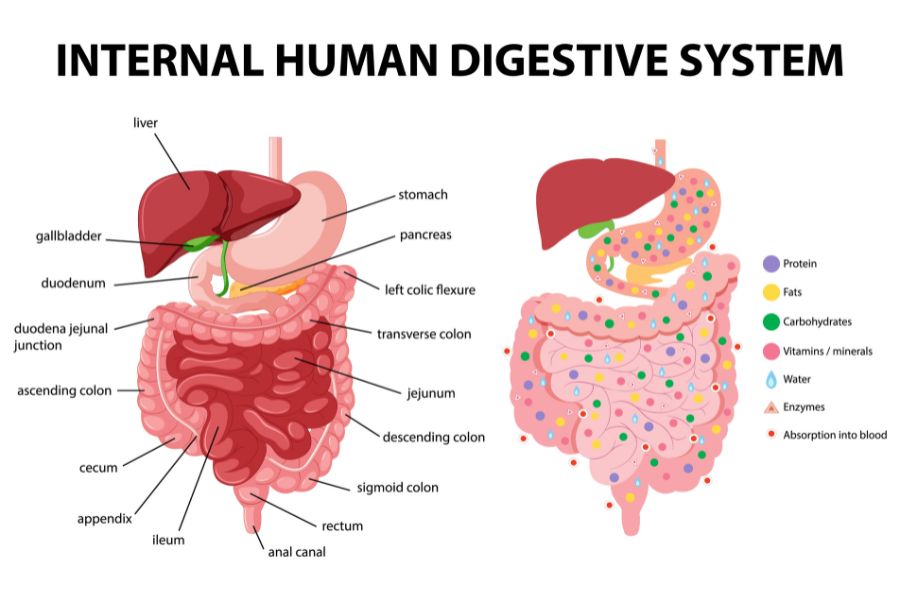IGCSE Biology Human Nutrition Notes: Essential Guide for Students
Human nutrition is a crucial aspect of biology that focuses on how the food we eat impacts our health and well-being. For students preparing for the IGCSE Biology exam, understanding human nutrition is essential. This article provides a detailed guide to the key concepts you need to know about IGCSE Biology Human Nutrition Notes throughout to help you focus on your studies.
Introduction to Human Nutrition
Human nutrition is the study of how our bodies use food to maintain health and support growth. In IGCSE Biology, this topic is vital because it explains how nutrients are processed and utilized by the body. Knowing the basics of human nutrition helps you understand the connections between diet and health, which is a significant part of your biology curriculum.
Macronutrients and Their Functions
Carbohydrates are one of the primary macronutrients and a major energy source for the body. In IGCSE Biology Human Nutrition Notes, you’ll learn that carbohydrates come in two forms: simple and complex. Simple carbohydrates, like sugars, provide quick energy, while complex carbohydrates, such as starches, offer a more sustained energy release.
Proteins are another essential macronutrient, crucial for growth and repair. They are made up of amino acids, which are the building blocks of tissues and enzymes. In your IGCSE Biology studies, you’ll explore how proteins are broken down into amino acids during digestion and how these amino acids are used to build new proteins.
Fats, or lipids, are important for energy storage and insulation. They also play a role in protecting vital organs. There are different types of fats, including saturated and unsaturated fats. Understanding these types and their functions is important for your IGCSE Biology Human Nutrition Notes.
Micronutrients: Vitamins and Minerals
Vitamins and minerals are essential micronutrients that the body needs in smaller amounts but are crucial for overall health. In IGCSE Biology, you will study various vitamins and minerals and their specific roles. For example:
- Vitamin A is important for vision and immune function.
- Vitamin C aids in the repair of tissues and helps the body absorb iron.
- Vitamin D is necessary for bone health.
Essential minerals include calcium, which is vital for strong bones and teeth, and iron, which is crucial for carrying oxygen in the blood. Your IGCSE Biology Human Nutrition Notes will cover these micronutrients and their effects on health and development.
The Digestive System

The digestive system is responsible for breaking down food into nutrients that the body can absorb and use. In IGCSE Biology, you need to understand the structure and function of major digestive organs:
- Mouth: Begins the process of digestion with chewing and saliva.
- Esophagus: Transports food from the mouth to the stomach.
- Stomach: Uses acids and enzymes to further break down food.
- Intestines: The small intestine absorbs nutrients, while the large intestine absorbs water and forms waste.
Understanding how each part of the digestive system contributes to nutrient absorption is a key topic in your IGCSE Biology Human Nutrition Notes.
Enzymes in Digestion
Enzymes are proteins that speed up chemical reactions in the body, including digestion. Your IGCSE Biology notes will cover how enzymes like amylase, protease, and lipase break down carbohydrates, proteins, and fats, respectively. Factors such as pH and temperature can affect enzyme activity, and understanding these factors is crucial for your studies.
Absorption of Nutrients
The small intestine is where most nutrient absorption occurs. Tiny finger-like structures called villi and microvilli line the walls of the small intestine and increase the surface area for absorption. In your IGCSE Biology Human Nutrition Notes, you’ll learn how nutrients pass through the walls of the small intestine and enter the bloodstream, which then delivers them to various parts of the body.
The large intestine plays a role in absorbing water and electrolytes from the remaining indigestible food matter, forming solid waste. This process helps maintain the body’s fluid balance and is a key topic in human nutrition studies.
Balanced Diet and Malnutrition
A balanced diet provides all the essential nutrients your body needs to function properly. In IGCSE Biology, you will study how different food groups contribute to a balanced diet and the effects of malnutrition. Malnutrition can lead to deficiency diseases like scurvy, caused by a lack of Vitamin C, or rickets, due to insufficient Vitamin D.
Understanding the importance of a balanced diet helps you grasp how nutritional imbalances can affect health. This is a crucial part of your IGCSE Biology Human Nutrition Notes.
Human Nutrition and Health
A proper diet plays a significant role in preventing various non-communicable diseases such as obesity and diabetes. Your IGCSE Biology Human Nutrition Notes will discuss how dietary choices impact overall health and how a balanced diet can help prevent these conditions.
CKM Academy: Your Resource for IGCSE and More
For students seeking additional support in their IGCSE studies, including human nutrition, CKM Academy in Borivali offers comprehensive coaching for IGCSE, A Level, and IB programs. CKM Academy provides valuable resources such as IGCSE notes and past papers, which can enhance your understanding of key concepts in biology and help you prepare effectively for your exams. With expert guidance and access to high-quality study materials, CKM Academy is an excellent choice for students aiming to excel in their IGCSE exams.
Ending Remarks
In summary, mastering the concepts of human nutrition is essential for your IGCSE Biology exams. By understanding the functions of macronutrients and micronutrients, the digestive system, enzyme activity, and the importance of a balanced diet, you can better appreciate how nutrition affects health. Use these IGCSE Biology Human Nutrition Notes as a comprehensive guide to prepare effectively for your exams and achieve success in your studies.
Image Reference: Freepik
Disclaimer: All trademarks, logos, and brand names are the property of their respective owners. All company, product, and service names used in this website are for identification purposes only. Use of these names, trademarks, and brands does not imply endorsement.




